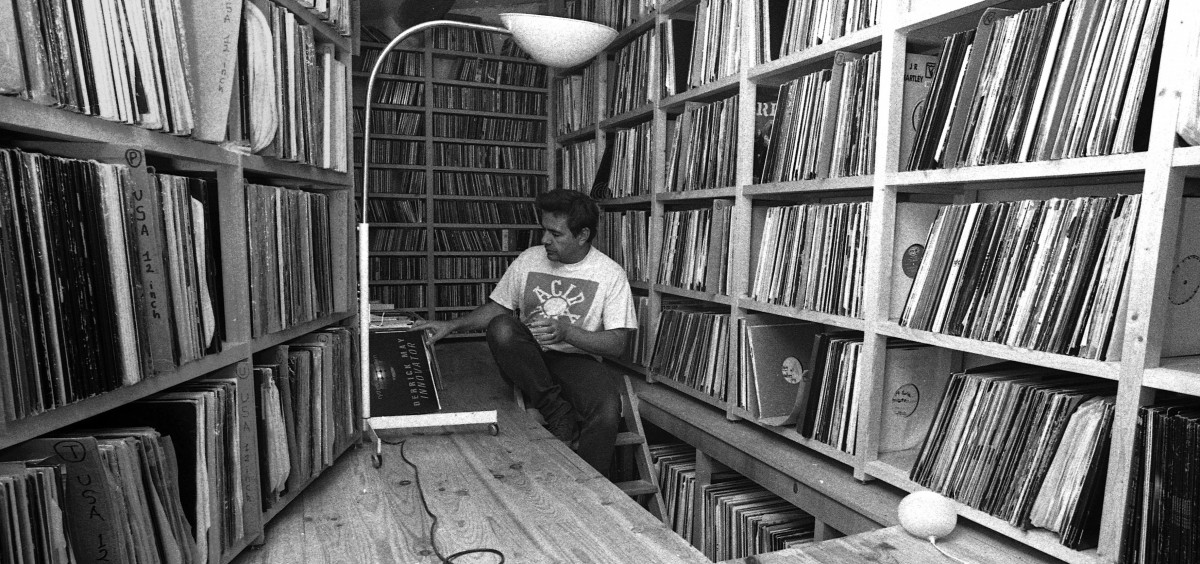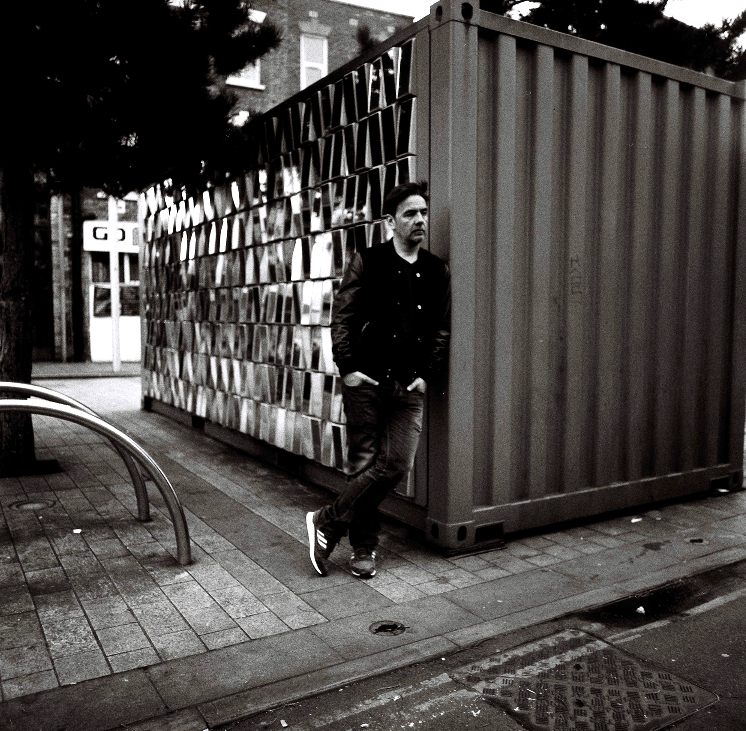Interview: Laurent Garnier
The veteran artist opens up about his creative impulses and clubland longevity.

Interview: Laurent Garnier
The veteran artist opens up about his creative impulses and clubland longevity.

“I have never been comfortable on the comfortable seat,” Laurent Garnier says, grinning with an animated sense of mischief. “I may have surprised some people, but I would have become very bored if I hadn’t done all these different projects,” he adds. “They just make me feel so alive.”
Although most widely acknowledged for the eclectic and ingenious nature of his DJ sets, an artistic avenue that has seen the French-born artist hold residencies at many of the world’s leading clubs over the course of the past 25 years, Garnier has diversified his catalog of creative works to such an extent that his career is on the verge of transcending music.
Outside of his beloved DJ booth, Garnier has produced a succession of stunning LPs and countless EPs; created his own online radio show; and written a lengthy semi-autobiographical book titled Electrochoc, which was rereleased with additional chapters in November 2013, and is due to be published in English for the first time in July this year. Most recently, however, Garnier has been applying his efforts to cinema—Electrochoc will be the basis for a feature film, specific details of which remain largely unknown. Sitting down for a rare interview with Garnier before his recent performance at Nuits Sonores Festival, it was on the progress of this latest project that the conversation began.
“We’ve been working on it [the film] for seven years now,” Garnier says. “Cinema is very complicated and we are currently looking to both finance the film and also look for a distributor, which is the hardest thing,” he adds. “It is certainly moving forward, and people seem to really the script. We have some of the cast confirmed and are hoping to shoot in March or April next year, but until the contracts are signed and sealed we cannot be completely sure whether it will go ahead or not.”
Although described as a journey through electronic music over the past 25 years, there is certainly an autobiographical tone to the book, and it’s worth asking how this will transfer to the big screen. “The book is very personal—that’s true,” Garnier explains. “In France, we say that we used me as a ‘redline’—but ultimately it is a book about the history of house and techno music, and that’s why we have interviews with Mike Banks, Jeff Mills and David Guetta,” he adds. “The book is extremely different; it’s a completely free adaptation. It is pure fiction in that there are no existing clubs or DJs in the story.”

Digging a little deeper, it becomes clear that while its focus is far from a memoir, it is also much more than just another trivial story about music. “Whatever you do, if you write a book or you do a film, as much as the main character is intended to be different to who you are, there will always be a percentage of yourself in there,” Garnier says. “When I was writing the script, I tried to distance myself from the main character to give him his own flesh, but reading it now, I can definitely see some similarities.”
“The film is about what a passion can do to your life, in both a good way or a bad way,” he continues. “I wrote the script with a scenarist and it is based on my thoughts, feelings and questions that I have asked myself having been touring as a DJ for over 25 years. From the outside, it seems the DJing is very glamorous—but it can be a very lonely life. I am still very passionate when I am behind the decks because it brings my life back together, but my feelings about spending all this time alone in hotel rooms is very different today than it once was. It’s another face of being a DJ that isn’t very well documented, and I think it is interesting to show it.”
Although Garnier’s DJing didn’t really grow until he discovered the Haçienda in Manchester in 1987, his infatuation with music was evident from a very early age. “My childhood bedroom was like a fucking discotheque,” he recalls. “My love for music started very young because it helped me by myself. I quickly realized that the best way for me to connect with people and express myself was by playing music and giving tapes to my friends,” he adds. “It [music] gave me an existence in society when I was growing up. It just made me be who I wanted to be.”
And as the conversation progresses, it becomes clear that this childhood passion still remains strong. Despite admitting to having had just two hours sleep the night before, there is an unmistakable energy in his voice that presents itself only when someone is talking about something for which they bear a great and enduring love. He sits up and laughs as he recalls that ever since he was 10 years old, his first thought when he hears a track that he likes has been “when and where can I play it?” This is more than an affection that has been learned over the years—for Garnier, it’s so deeply engrained and inherent that it could easily be marked an obsession.
“I am always questioning my ability—and so I work and work to find ways to improve, because my duty is to give my audience the best night of their lives.”
“I put more effort into finding new tracks and fine-tuning my DJ sets today than ever before,” he says. “As an artist, I am always questioning my ability—and so I work and work to find ways to improve, because my duty is to give my audience the best night of their lives. If I do not question myself, then this magic ability will fade very fast,” he adds. “In many ways, it is like a drug because I will never be satisfied with what I have. There is always this feeling inside me that I have missed something, and I will go to blogs or websites to find that one track that I feel I need, because if ever I miss the super-duper wonderful track then I simply haven’t done my job as a DJ.”

Central to Garnier’s longevity and diversification has been an insatiable crave to innovate. The most striking, and arguably the most intriguing, point of our conversation concerns the origins of the film because it reveals much about Garnier’s underlying character and the reasons behind his career. Far from being sparked by a definitive infatuation with cinema, the initial inspiration for the film stemmed only from his profound desire to explore new creative outlets. “All the projects I have done in my life have come very easily: You meet a person, you get on well and just realize you could have a good working relationship together,” he says. “Like doing the film or writing the book, there are just so many exciting things to do outside of just DJing, and I’m still passionate because I am constantly stimulating my brain and I think this is important,” he adds. “You really need to feed your brain with something. I can see some of my friends who have been doing nothing but DJing for the past 20 years and I do not think they are very happy.”
Garnier’s career is a quite remarkable —not only the breadth of his artistic achievements, but also how he’s remained so current in the rapidly evolving scene of underground electronic music. It is for this reason that he is considered, by some, to be the greatest DJ ever to have lived. “I am absolutely drowning in good music because there is just too much,” he says. “But I feel connected with the music that is out there and I think this inspiration has always been reflected in my work.”
As the conversation continues, Garnier begins to discuss his future prospects. So fundamentally important to his success has been this passion, and he accepts the fact that one day it may eventually fade. “If it does, I will quit,” he says. “I only do it because I love it.” In order to maintain this motivation, Garnier goes on to explain how he limits his DJ schedule to “one weekend every two weekends” because it’s important that he “craves going to play.”
“I do not want people to come and see me because I am a curiosity after having DJed for all these years; I want people to come and see me because I can still give them a special time.”
“There have been a number of points when I have thought quite seriously about stopping music altogether,” confesses Garnier. “These doubts and questions are becoming louder as I grow older because I am playing in front of crowds of people who could all be my children,” he continues. “It’s important to me that I don’t become a thing of the past. I do not want people to come and see me because I am a curiosity after having DJed for all these years; I want people to come and see me because I can still give them a special time.”
The discussion ends with Garnier going to get some sleep before his headline DJ set. He is next seen the following morning—on stage, utterly consumed in his work, connected with and controlling the thousands of elated fans. It’s a beautiful moment: he was scheduled to finish half an hour ago but Garnier just wanted to continue.
Still the party displays no sign of drawing to a close and, when Garnier is behind the decks, neither does his illustrious career.

